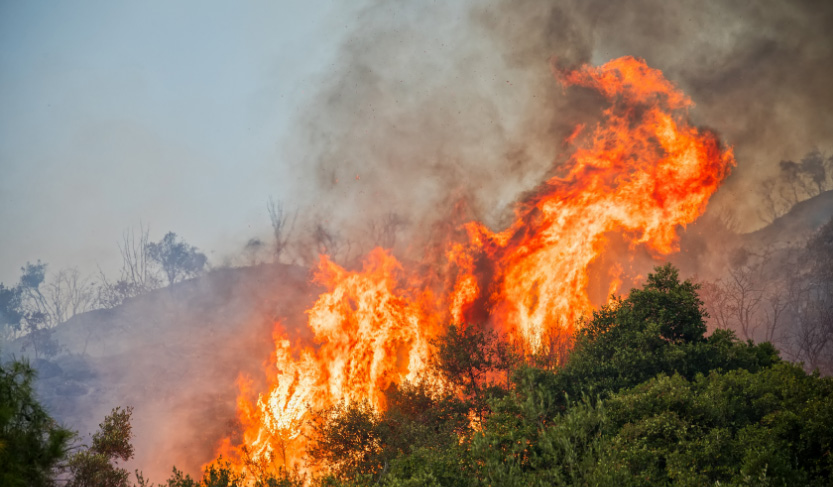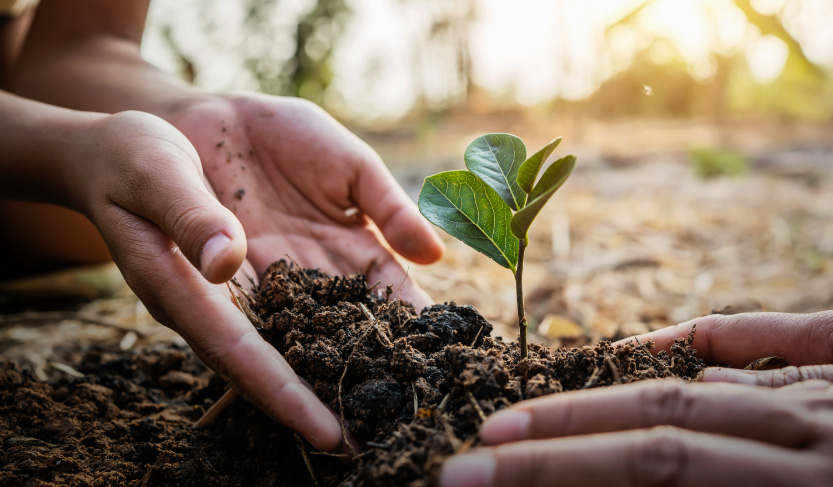
Deforestation Consequences and Solutions
"...Co-operation, mutual aid and reciprocity are essential characteristics in the unified body of the world of being, inasmuch as all created things are closely related together and each is influenced by the other or deriveth benefit therefrom..."

In our previous blog post, we explored the root causes and historical context of deforestation. Despite the vital role forests play in maintaining a healthy environment, industrialization, population growth, and agricultural expansion continue to drive deforestation at alarming rates. In this blog, we will examine the devastating effects of deforestation in further detail and offer practical strategies to combat it and create a sustainable future for our planet. Join us in protecting our planet and its precious resources.
Some Consequences of Deforestation
Tropical deforestation persists at alarming rates with profound effects on ecosystems, the environment, and livelihoods.
Deforestation Effects on Climate
Since forests, especially tropical forests, are the most significant CO2 absorbers in the world, it is estimated that more than 1.5 billion tons of carbon dioxide are released into the atmosphere yearly due to deforestation and forest burning. When trees are cut down, they do not absorb CO2 any longer and release most of the CO2 stored in the wood into the atmosphere 1. Deforestation terminates the vast rainforest ecosystem, affecting climate and forming a drier environment, increasing the risk of fire. As such, deforestation leads to forest fires and, subsequently, more release of smoke into the air, causing more air pollution and health risks. Moreover, smoke from these fires also interacts with clouds and the Sun to decrease rainfall and increase dry and fire-prone conditions.

Although unbridled industrial activities, limitless consumerism of today's humans, and indiscriminate use of fossil fuels are prominent causes of current global warming and climate change, deforestation has played a notable role in climate crises. Forests are called terrestrial carbon sinks as they store more CO2 than they release and absorb about 30% of the carbon emissions caused by fossil fuels. Deforestation or forest fragmentation provides an extended edge in the forests and several other disturbances. Studies by Morreale and Hutyra at Boson University, published in 2022, show that trees at the border do not absorb as much CO2 as in the interior part of the forest because they are more heated and less grown. Moreover, studies show that warmer temperatures at the rural forest's edge caused leaves and organic matter to decay faster, causing the soil microorganisms to work more and release more carbon dioxide than their cooler, shady counterparts in the forest interior.
Simultaneously, deforestation fragments the forests, and the more heated and drier edges and patches cause more fire occurrence. Studies by R. Libonati et al. published in the Journal of Scientific Reports in 2021 show that 95% of active and the most severe fires are observed within 1 km of the forest's edge. Moreover, deforestation reduces the beneficial role of trees in capturing greenhouse gases and trapping heat in the earth's atmosphere to prevent global warming and climate change.
Altogether, studies show that curbing deforestation, as a significant global goal, can help us reduce climate change.
Deforestation Effects on Biodiversity
Forests are the habitat and food source of many living species. A complex ecosystem of different species consisting of about 80% of animals and plants live in forests. Deforestation causes biodiversity loss, and many plant species become extinct meanwhile. Due to the deforestation process, many animals lose their habitat and food source and cannot relocate. This is how it threatens the biodiversity of animals and plants. As a significant global goal, preventing Deforestation can help us conserve biodiversity.
Deforestation Effects on Soil
Trees protect and stabilize the soil and prevent erosion. As such, deforestation weakens and destroys the soil, decreasing water filtration, and the region becomes more vulnerable to natural disasters such as landslides, floods, tsunamis, and storms.
Deforestation Effects on the Economy
Forests provide food, medicine, and livestock fodder and are a rich source of employment and income.
Forests produce a thick cloud above the Earth, reflecting sunlight to space and keeping our globe cool.2 Moreover, forests can cool the air in urban areas up to 8 degrees, decreasing air conditioning requirements by 30 percent, as UNECE reported. By cooling the temperature, forests reduce fossil fuel use and provide many economic and climatic benefits.
Deforestation Effects on Health
Deforestation causes the proximity of humans to animals and other biological species, increasing epidemics and infectious diseases among humans. In addition, more than 25% of the medicines that humans take come from rainforest plants, and more than a third of our major cities receive a significant portion of their high-quality drinking water from protected forests, as UNECE reported.
How to Stop Deforestation
Here are some solutions that we can all implement to help reduce deforestation.
Plant Trees
Although absorbing atmospheric carbon from new forests takes time, preserving and maintaining forests, reviving and planting trees in them is still one of the effective ways to solve human environmental problems. The international research team, led by Jean-Francois Bastin of ETH-Zurich in Switzerland, found that the Earth's ecosystems can support 900 million hectares of forest, 25% more than the current forest area.

According to the authors in the Journal of Science in Jul 2019, by planting more trees, we could sequester about 205 gigatons of carbon and reduce atmospheric carbon by about 25 percent. Moreover, studies in 2007 at Stanford University CA, show that afforestation projects in tropical regions will be more beneficial in mitigating global warming.
Consume Wisely
UN Food and Agriculture Organization (FAO) estimates that approximately one-third of the food produced worldwide for human consumption is wasted or lost each year. Countering consumerism reduces deforestation. Consuming less and not buying things we do not need are ways to prevent deforestation. Meat, paper, and timber play a significant role in this regard, and less consumption means less need for deforestation.
Recycle
Separating dry and wet waste, giving dry waste to recycling centers, recycling or donating clothes and things we do not need, buying recycled products, and taking good care of our digital devices can help avoid deforestation. We can use our cell phones as long as they work, and if we decide to update, we need to ensure they get into the hands of the people who will use them. This is because of the production of each of these digital products, mining activities are carried out to extract the required metals, which is one of the reasons for deforestation.
Use Eco-friendly Products
When shopping, we should be more careful about buying sustainable and environmentally friendly products. It would be good to consider the source of what we use and purchase eco-friendly certified products whose production is less harmful to the nearby forests.
Support and Join Organizations Fighting Deforestation
We can support and join organizations fighting deforestation and thus work in tree planting or combat deforestation, strengthening steps in protecting the environment.

Raise Awareness
We can inform our family, friends, colleagues, or anyone around us of deforestation, and its dangers, and help them know more about the influential role they can play in this field. Efforts to reduce deforestation and strengthen forests start with small individual steps.
Altogether…
Forests are the lungs of the Earth. How can the world breathe if there are no forests? Knowing how deforestation threatens us and all plant and animal species, we must prevent this crisis from spreading as much as possible. The Earth and its blessings have come to us from our ancestors, and now it is our mission to properly hand this trust to future generations. Join us in our mission to plant trees on a global scale and help us create a healthier, more sustainable world. Together, we can make a difference.
Read Our Insightful Blog Posts

Top 8 Innovations Shaping Our Green Future
Stay ahead with the latest sustainable innovations transforming our world. Explore cutting-edge technologies and solutions shaping a greener future.

Agroforestry: Revolutionizing Farming, Empowering Farmers, and Protecting the Planet
Discover the benefits of agroforestry, a sustainable solution that supports farmers and environmental protection.

The Joy of Giving: Unveiling the Neuroscientific Reasons Behind Charitable Donations
Uncover the neuroscience behind charitable giving and discover how acts of generosity can significantly uplift your mood, enhance social bonds, and contribute to a more fulfilling life.
Green Your Inbox!
With our Newsletters, Stay updated on our Stories of Change and Growth.
As a gift, get a personalised Nature E-card from PH.

